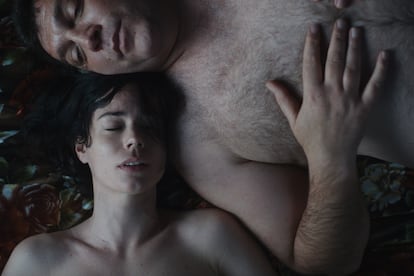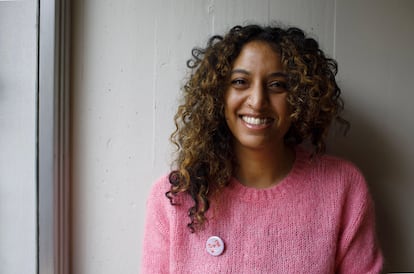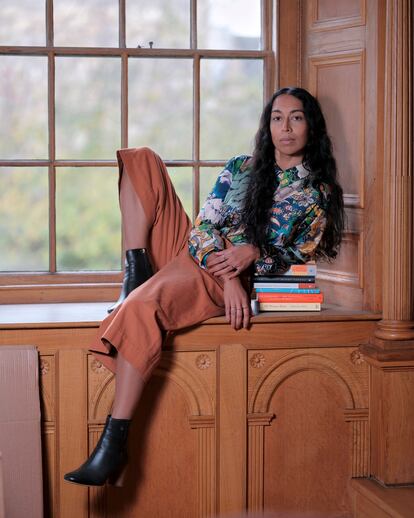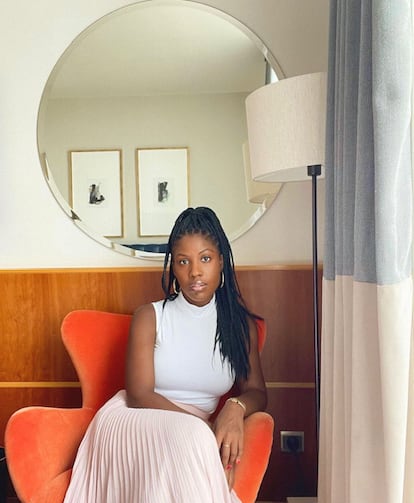Heteropessimism, sex and power games: The new stories about young women clinging to older men
A variety of recent novels and films explore unequal relationships, which are based on mistrust and self-destruction


In the Spanish film Un Amor, a translator named Nat — the tormented protagonist — is facing sleepless delirium. Fleeing from herself, she settles alone in a dumpy house in the countryside.
Adapted from a novel by Spanish writer Sara Mesa, the iconic director Isabel Coixet presents a young woman who is about 10 or 12 years younger than Andreas, the 50-year-old who she ends up clinging to in a suffocating, isolated town. Nat discovers that there’s also an abyss in the years that separated the repairman from his first wife — “more than 20,” he tells her — and she begins to feel tinges of jealousy whenever a girl approaches him.
By no means is Nat the only recent literary heroine who’s with a man who could be a friend of her father. In Raven Leilani’s Luster (FSG, 2020), Megan Nolan’s Acts of Desperation (Little, Brown and Company, 2021), Sheena Patel’s I’m a Fan (Graywolf, 2022) or Emma Cline’s The Guest (PRH, 2023), we see this narrative trend. These female authors — paraphrasing Becky G’s song about liking “older men” — have offered a new paradigm in the narratives of heterosexuality.
In this branch of the love plot (although love doesn’t seem to be very present), the psyche of young women who, in their 20s or 30s, become obsessed with lovers from an older generation is analyzed. This vital age gap serves as a narrative crutch to deploy power games about desire, sex and expectations.
Neither clueless nor defenseless, these protagonists are independent and brave. Yet, they’re trapped in the contradiction of having inherited romantic ideals that they deny. These are novels to understand what happens when — whether due to disdain for your family, class aspirations, comfort-seeking, or pure emotionality — your obsession is to get the attention of an older man.

An idea that’s frequently repeated is that it’s easier to imagine the end of the world than the end of capitalism. Hence, it’s not surprising that, in some of these works of fiction, the youth of the protagonists is interpreted as a form of currency — symbolic capital in romantic transactions.
In Un Amor, Nat feels that the decade between her and Andreas makes her “powerful” and “raises her market value.” Something similar happens in I’m a Fan, where the nameless protagonist believes that showing off the highest peak of her fertility gives her added value for her mature lover. “I think: I’m young, I have eggs, I can generate life for him… I [can] show off my relative youth and my beauty compared to his wife,” the narrator reflects in the novel.
This artist — in her late-20s or early-30s — is the daughter of migrants in London. She’s tired of living with a lame boyfriend and obsessed with an artist older than her who — in addition to being married to another (older) woman — ignores her in front of another lover, who is whiter, richer, more stylish… and with more followers on Instagram.

“Youth is something that women can use against other women. It’s a fear that assails you. As a woman, you know that you can be replaced,” Patel explains, in an email exchange with EL PAÍS, regarding the use of fertility capital in her novel. Inspired by the memoir Life with Picasso (1964) by Françoise Guilot, Patel — who began writing in the collective 4 Brown Girls Who Write — affirms that, in her debut, the power game between these lovers isn’t only executed through age (“something that’s already been explored a lot in the past”), but via what they expose of themselves in the virtual world. “What’s new and interesting is seeing the social media dynamic between [the protagonists]. I wanted the narrator to have power, but also to be subject to [the power of] others,” she clarifies.
Something about all these heroines — who bypass their contemporaries due to stress, or out of pure disinterest in men of their age — connects with social readings about the confidence bias in heterosexuality. Essayists such as Asa Seresin, Katherine Angel and Amia Srinivasan explore this. Seresin defined this era a few years ago in The New Inquiry as one of “heteropessimism” — marked by a feminine detachment towards men, who are seen as the root of the problem in theory, although they continue to hopelessly desire each other in practice.
In Tomorrow Sex Will Be Good Again: Women and Desire in the Age of Consent, Angel builds on this theory by talking about how regret, shame and desperation have permeated women in their relationships. Meanwhile, in her essay Talking to My Students About Porn, Srinivasan comes to the conclusion that if her university students are more feminist than those of her generation (who didn’t publicly declare themselves to be feminists) it’s because “there’s a worsening of their circumstances regarding sex” with men of their age. How are novels supposed to discuss love, if the young women out there only feel distrust for others?

“Beyond the fact that older men have [healthier finances] and [more] knowledge about the clitoris, there’s the powerful drug that’s the profound imbalance of power,” thinks Edie, a 23-year-old editorial coordinator in New York, who’s barely surviving. She’s the star of Leilani’s novel Luster, a much-applauded debut about the boredom that young women feel about their male peers. Edie — who boasts of “screwing” men of her age “out of biological necessity” — will end up in a three-way relationship with Eric (her “total daddy” and “the only man in [her] recent memory who has made [her] come, who isn’t even on Twitter”) and his wife, Rebecca, who establishes the rules (doomed to fail) between Edie and Eric’s meetings.
Aware of the privileges and class abysses that separate them from their lovers, the young women in these works of fiction, for the most part, have a hard time making a living. By being with more established lovers, they achieve the comfort of a life that’s far away from precariousness. For Edie, “an older man is a wonder because he’s been paying gas bills for 38 years,” while for Alex — the 22-year-old escort who’s the protagonist of The Guest — anguish increases when she thinks about men in their 20s, who “have to make everything mean something, have to turn every choice and preference into a referendum on their personality.” Perhaps this is why the protagonist of Emma Cline’s novel opts to start a relationship with Simon, a rich older man who takes her to his summer home in the Hamptons, without realizing that she’s a prostitute with debts, who’s disappointed with everyone who has passed through her life.
Cline narrates that it’s “much better to have the buffer of an entirely different generation: the older men had no context for Alex, couldn’t even begin to inadvertently piece together any semblance of her real self.” This adds context to a lost young woman, who can only see a future for herself if it happens alongside a lover.
“We’re all immersed in a collective process of self-harm,” the protagonist in I’m a Fan narrates, while reflecting on her condition. She’s not alone. In Acts of Desperation — the novel by Megan Nolan, who hails from Ireland — another nameless girl in her 20s is obsessed with an older art critic. Thus begins a descent into hell for the attention of a lover, bordering on trauma porn. “How impoverished my internal life had become, the scrabbling for a token of love from somebody who didn’t want to offer it,” the protagonist thinks, upset by her strong feelings.
Without a nod to the well-worn romanticism with which Hollywood educated these women sentimentally, the feeling of muddiness permeates everything. “For the first time in her life, a grown man loves her. For the first time, she finds herself more and more drawn in with each encounter,” says the voice that narrates Kairós, the latest novel by Jenny Erpenbeck. In this novel, the unbalanced love affair between Hans — a writer in his 50s — and Katharina, a 19-year-old girl, begins in the late-1980s, shortly before the fall of the Berlin Wall. The leap into the past — unlike the rest of the novels mentioned in this report — will be the backdrop to narrate the disappearance of the country in which the author grew up, East Germany. “Maybe women today are a little more aware that you have to say ‘no’ when something doesn’t seem right,” Erpenbeck reflects, in an email exchange with EL PAÍS.
Erpenbeck is the only author who reveals to the reader what the lover thinks during the affair. In the rest of the aforementioned novels, the men neither feel nor matter. These are works of fiction where male thought is omitted. The only leading voice — the authentic self-censoring voice — is a female psyche that, by itself, is already trained in aloofness, self-deprecation and obsession, with the other’s gaze on her body.
Oscar Wilde said that “everything in the world is about sex except sex. Sex is about power.” If these stories reveal anything, it’s that every narrative about female desire is about power. And there’s no relationship more complex than the one a woman establishes with her own thoughts.

Sign up for our weekly newsletter to get more English-language news coverage from EL PAÍS USA Edition
Tu suscripción se está usando en otro dispositivo
¿Quieres añadir otro usuario a tu suscripción?
Si continúas leyendo en este dispositivo, no se podrá leer en el otro.
FlechaTu suscripción se está usando en otro dispositivo y solo puedes acceder a EL PAÍS desde un dispositivo a la vez.
Si quieres compartir tu cuenta, cambia tu suscripción a la modalidad Premium, así podrás añadir otro usuario. Cada uno accederá con su propia cuenta de email, lo que os permitirá personalizar vuestra experiencia en EL PAÍS.
¿Tienes una suscripción de empresa? Accede aquí para contratar más cuentas.
En el caso de no saber quién está usando tu cuenta, te recomendamos cambiar tu contraseña aquí.
Si decides continuar compartiendo tu cuenta, este mensaje se mostrará en tu dispositivo y en el de la otra persona que está usando tu cuenta de forma indefinida, afectando a tu experiencia de lectura. Puedes consultar aquí los términos y condiciones de la suscripción digital.








































